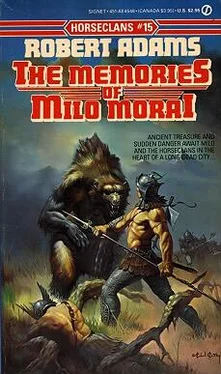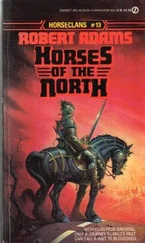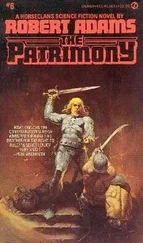“Yes, sir,” replied Milo.
The colonel nodded brusquely, “Yes, well, I’ll tell him about all this and mention just how much your cooperation helped us.”
Turning to the surgeon, who was just then preparing to set the apparently broken arm of one of the MPs, he asked, “Well, Eddie, what’ll you do with Jarvis now?”
The medical officer shrugged, then winced, and said, “Hell, we have no facilities for a case like his here, colonel, you know that. Ship him down to the N-P section at Walter Reed, I guess.”
Barstow left Holabird for a few days, and upon his return, he and the five officers he had brought from Germany, plus another lieutenant, three sergeants and four privates, departed Holabird in three Army sedans followed by a three-quarter-ton weapons carrier loaded with their duffel bags, B-bags and other luggage.
Milo had, for some reason, assumed that their destination was either the District of Columbia or the area of Virginia just south of the capital, but he was proved wrong. The small convoy slowly threaded its way through the congested traffic of Washington, crossed the Fourteenth Street Bridge and headed south on Route 1.
In addition to the driver, one of the newcome privates, Milo shared the sedan with Lieutenant Eli Huber and the new officer, Lieutenant Vasili Obrenovich. To the new officer, he said, “You know the lay of the land now better than we do. Where do you think we might be going?Belvoir, maybe? We’re well past Fort Myer.”
“We’re now past where we should’ve turned off this highway for Fort Belvoir, too, sir. I dunno, really. Let’s see now. South of here is Camp Hill, but I doubt we’d be going there. The next real post south after that would be Camp Lee. Sorry I can’t be more help, sir.”
All following the lead automobile, General Barstow’s conveyance, the convoyette proceeded on south on Route 1 in the crisp, late-autumn weather, through northern Virginia. Woodbridge fell behind them, then Dumfries, Quantico and Stafford. They passed through Fredericksburg, Thornburg, Ladysmith, Cedar Forks and Doswell. In the sleepy college town of Ashland, the lead vehicle was seen to pull off the road, and the other four faithfully followed.
After a brief consultation with Barstow, Captain Sam Jonas handed the driver of each of the vehicles a five-dollar bill and ordered them to have their vehicles gassed and serviced at the Shell station across the road, then return, park them and join the rest of the party in the restaurant.
“That’s damned funny,” remarked Lieutenant Obrenovich, with a look of puzzlement.
“What is?” asked Milo.
“The money the captain gave the drivers, sir,” Obrenovich replied. “Every movement I’ve been on, if civilian POL facilities had to be used, they were paid in Army scrip, not in cash. This must be some kind of really hush-hush operation that nobody wants any records of.”
Neither he nor any of the others then could have known just how rightwas his surmise . But they would all live to learn.
All fed and refueled, they headed out south once more. In the city of Richmond, they changed routes and direction, east on Route 60, through Sandston, Roxbury, Providence Forge, Lanexa, Toano, Norge, Lightfoot and on toward Williamsburg.
“Any ideas yet, lieutenant?” asked Milo tiredly.
“Oh, yes sir,” was the quick reply. “There’s only three places down here we could be going—Camp Eustis is just the other side of Williamsburg, then the Army Air Corps has an airfield called Langley near a town called Newport News, and of course there’s Fortress Monroe, in Hampton. I hope it’s Monroe—I’ve heard that that’s a good-duty post.”
They pulled off the highway and onto the road to Camp Eustis, but once waved through the main gate, they drove directly to the main motor pool, where all—officers and enlisted, male and female—with the sole exception of Barstow were loaded aboard a deuce-and-a-half truck. Then the tailgate was raised and secured and a thick canvas curtain was lashed tightly across the back opening. They sat on the hard wooden seats, crowded closely with their bags and cases piled on the steel bed between the two benches.
Once they were underway, Captain Sam Jonas said, half shouting in order to be heard above the noise of the big engine, “This is orders. It’s felt that we’ll be better off not knowing just where we’re going, how to get there even. The only one who’ll know that, for a while, will be the general; he’s in the cab of this truck. No, don’t bother to ask me any questions—I don’t know any more answers than whatall I’ve just told you.”
As they dismounted after a long, bumpy, exceedingly uncomfortable truck ride, they were given no time to look around, but were ushered into the first floor of a building that looked to Milo’s experienced eyes like a wooden barrack with all its windows covered by sheets of tar paper. Inside were a score of folding chairs, a few one-gallon butt cans and one thirty-gallon GI can.
Barstow stood beside a rack of brand-new mops and brooms, facing the door by which they all entered. “Sit down,” he ordered brusquely, adding, “This won’t take long, then you can start getting situated in the quarters you’ll occupy while we’re here. Smoke ’em if you’ve got ’em.”
With everyone occupying one of the less than comfortable chairs, Barstow, still standing, said, “First off: where you are; you don’t know, you don’t need to know and most of you aren’t going to know, so don’t try to find out. There are no public telephones here, and the few outside lines are and will stay under lock and key. Keep away from them or your ass will be grass. Understand? You may write all the letters you want with the understanding that they’ll be thor-oughly censored before they go to the place from which they’ll be mailed; you’ll all be given an address to use for return mail.
“Second point.” He ticked off another finger. “And listen damned tight to this—your life could depend on your comprehension of what I’m about to say. You are all restricted to the confines of this cantonment area, no ifs, ands or buts, no exceptions of anybody at any time or for any purpose whatsoever! When you get out of this building, you’ll see that there is a twelve-foot chain-link fence topped with triple strands of barbed wire completely surrounding mis post. Keep away from it—it’s electrified with enough juice to fry you crisp. Eight feet beyond the inner fence is an outer one, and the space in between them is filled with barbed-wire concertinas three feet deep. The gates are as high as the fences and fitted with tamperproof alarms. There are guard towers, manned on a twenty-four-hour basis, with searchlights and machine guns and men who are under orders to use them against any human being who tries to get over those fences—coming or going—or through those gates without authorization, and there are walking sentries and jeep patrols, as well as other safeguards that, although you can’t see them, are no whit less deadly.”
“Arbeit macht frei,” said Padre bitterly, to no one in particular. Then, to Barstow, “And just how long have you sentenced us all to your private little—most likely, highly illegal—concentration camp, general?”
Barstow merely shrugged. “Call it what you wish, Lieutenant Metz. It wasn’t my idea . . . well, at least not all of it, anyway. Very tight security is needed for this relatively short but urgently vital operation, and this is the only way of which we know to maintain such a state of full security at all times.”
“Security?
Security from who, from what, general?” Padre yelped. “Japanhas surrendered now, the Nazis were finished last May, so just who is there any longer to keep secrets from? Or do I really need to ask that of a quasi-Fascist reactionary like you?”
Читать дальше












